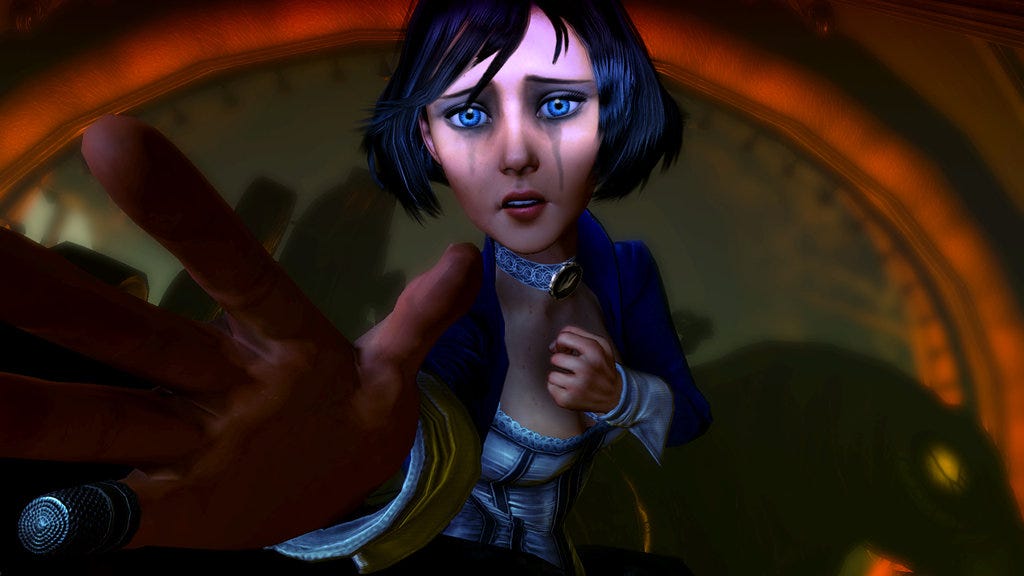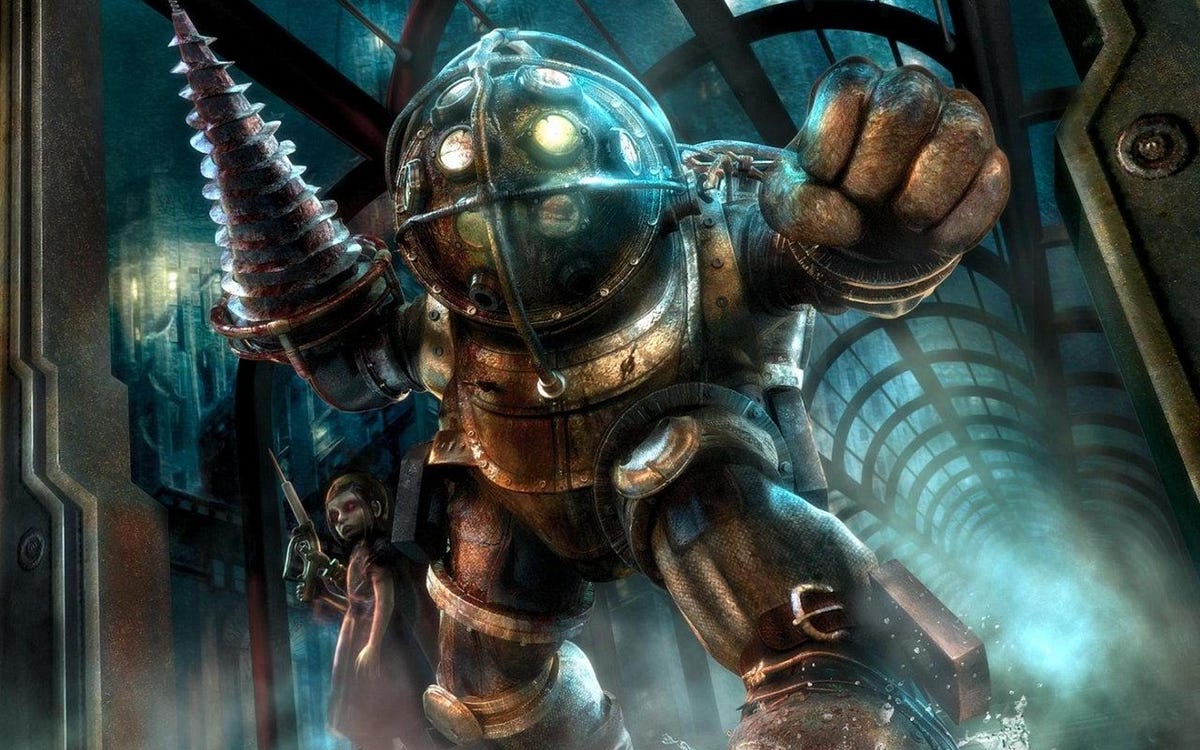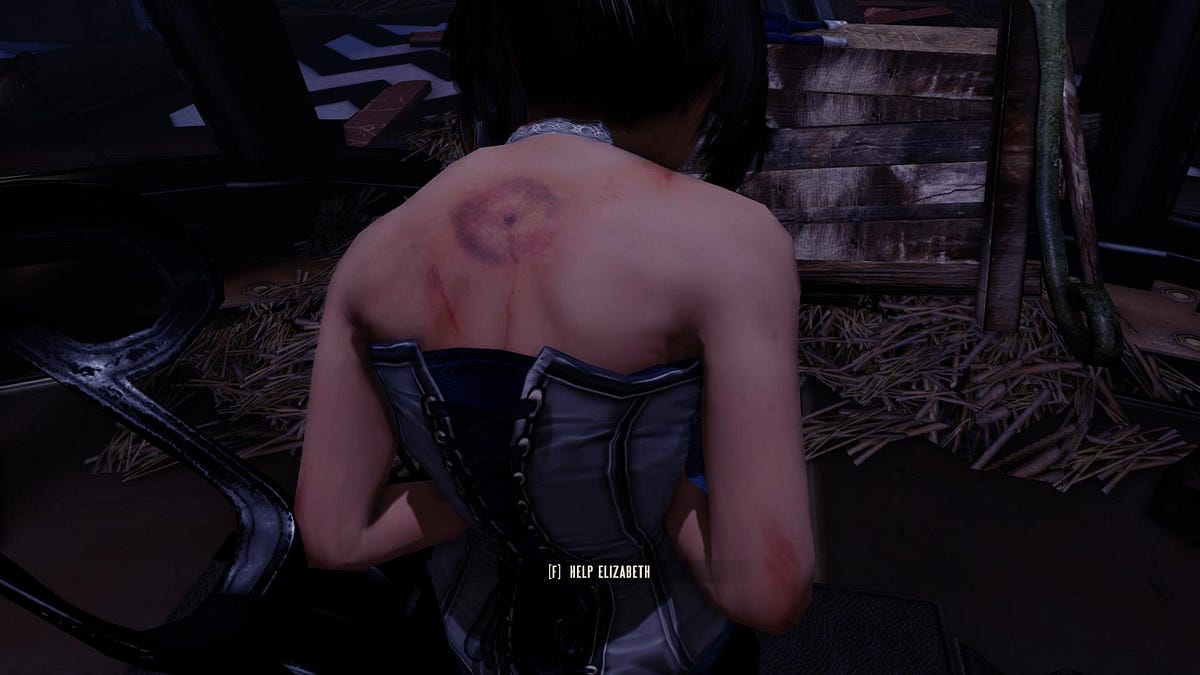Content warning: this contains explicit descriptions of abuse and discussion of suicide, as well as spoilers for the ending of Bioshock Infinite

“I’m sorry, I’ll be good, I promise,” Elizabeth is crying. I’m crying too, because I’m no longer just sitting at my computer playing a game, I’m also begging and crying for him to let me go, promising to be good, anything to stop this from happening again.
I have to stop playing, I thought. I have to get through this, I can do it. My mind was on the game but my body was somewhere else, somewhere that I swore I’d never go back to, but things keep happening that take me back there. Trauma lives in the body, my therapist says, and I don’t know how else to explain it – flashbacks are a memory that live in my body, so I can be somewhere and know that it is now, and still feel in every fiber of my being that I’m back there again.
I didn’t want to get involved with S at first, not seriously anyway. I’d just gotten out of a serious relationship and I needed time to grieve and recover first. I’ve always taken a lot of time after my relationships – I’ve never done the rebound thing. Aside from that, I was determined to finally go to Japan, something I’d been putting off while I was involved because I didn’t want to be in a ridiculously long distance relationship.
But S was persistent. He’d never met anyone like me, he said, and he didn’t want to lose his chance. I was geeky and funny and fun and stylish, he said – everything he’d ever wanted.
Bit by bit I yielded. He was smart and funny and we had so many common interests – and he had the most amazing library of games I’d ever seen. I was still planning to go to Japan (nothing could change my mind about that) but we’d spend as much time together as possible before I left, and he’d be waiting for me in California when I came back.
By the time I was getting ready to leave for Japan, I was hooked, and I remember breaking down in tears one night because I felt bad for leaving him behind. “I didn’t think you were the crying sort,” he said, looking at me with what seemed like mild exasperation. Then he grabbed me and kissed me and held me tight and I stopped crying, surprised.
“I hope that always works to make you feel better,” he said, and I nodded and assured him that it would.
When I left, he booked a flight for himself so he could accompany me from SFO to LAX. We sat across the aisle from each other on the mostly empty flight and the flight attendant gently teased us for being so lovey dovey. We had an hour or so in LAX before I continued on alone to Osaka, and we dozed off leaning against each other sitting at a table in the middle of the busy airport. I couldn’t imagine anything sweeter or more romantic.
Not long after I arrived in Japan, he began making plans to visit me there. He apologized profusely for not being able to make it in time for my birthday, then surprised me, showing up on my birthday after all – he’d coordinated with my roommates to arrive earlier that day and was waiting in my room for me to return from work.
“I hope you don’t expect me to ever be able to top this,” he said.
He stayed for a month, and other than that first giddy night, I remember his visit with misery. We fought all the time and I never knew exactly what we were fighting about.
One night I came home and found there was no toilet paper in the house. I asked him why he hadn’t gone to the convenience store to buy more. When I expressed disbelief at his response (“I didn’t use any so I didn’t know it was gone”) he told me I was calling him a liar and that this was the worst thing I could say about him, and no amount of my reassuring him that I was just surprised and confused would sway him.
“No, you think I’m an untrustworthy asshole. You think I’m an awful person,” he said, eventually storming off to the convenience store, presumably to buy toilet paper. Screaming in frustration, I threw my purse off the balcony after him, shattering my electronic dictionary.

Goodbye, electronic dictionary
“Why did you stay?” is the worst question you can ask a survivor, but it’s the question I asked myself for years afterwards.
I blamed myself for our fights. I didn’t know how to talk to him right, I was too sensitive, my expectations for communication were unreasonable – I just knew that if I could just figure out the right way to talk that would make him listen instead of getting upset, then everything would be good. It would go back to the way it was before I left.
Then his father got sick. It was unexpected, his health was really good, he was fairly young and fit. It was serious, at first he was in and out of the hospital a few times, and then he was just in. It didn’t seem hopeful, so I came home, breaking my contract early, returning after 10 months instead of 12.
His father passed away a month after I returned.
The misery that was his visit, that I’d hoped was a fluke, a result of my culture shock and homesickness and his – it continued after my return. I thought it was because of his father’s illness and then his passing, I thought I could make it better, I thought I just needed to be there for him more.
I got a job testing video games. I bought games and played them to relax. I played a lot of World of Warcraft, too, and we played together, along with his roommate, and things mostly seemed good when we played.

Does that look like a player character to you?
One of the games I bought was Bioshock. “I’ve heard this is really good,” I told him and he looked at the cover and grunted noncommittally. Later he told me that he thought the Big Daddy on the cover was the player character, and he didn’t want to play something that looked so stupid, but he never played anything I recommended. He only started playing it after he saw me playing it, and because he was unemployed, he finished it before I did. I had to keep telling him not to tell me how to play. One time, he needled me so much about how I was playing that I picked up the wrench in-game and started taking my anger out on splicers. I didn’t want another fight. I just wanted to be allowed to play in peace. After that he left me alone, because he couldn’t stand to watch me using the wrench, and I beat the entire game that way. I was so proud of myself for biting down on my anger and channeling it into the game instead of getting into another fight.

Years later, and I’m playing Bioshock Infinite and the worst night of my life comes crashing in on me, a memory so visceral I feel as if I’m in two places at once. I’m at my computer, alone in my room. I’m curled up on the bed, crying. I’m lying on the bathroom floor, waiting to die.
It started small, like it always did. I asked him if he was coming to bed and he said “soon” and then I lay there for hours, waiting, knowing that if I said anything it would be disaster but unable to stop myself because I couldn’t understand why he couldn’t just say “not tonight”. But he never did, and my choice was silence or to ask why and be told that my question meant that I was calling him an asshole. Or that I didn’t believe he loved me. Or that I thought he wasn’t good enough.
But I couldn’t stop myself from asking why, so I knew that everything that happened was my fault. He would apologize over and over, and his apologies meant only that I shouldn’t ask why, never ask anything at all except what he wanted for dinner.
This time why meant three days of fighting.
I was never allowed to leave and if I tried, he would pin me down. Most of the three years we were together, my wrists were bruised because he’d been restraining me, to keep me from walking out, to get away from him telling me all the awful things my questions were saying about him.
I was allowed to leave if I seemed calm and I told him I needed to go to the bathroom or get a drink of water, or to fetch something for him.
After three days of this without eating or sleeping, I knew there was only one way out. It was New Year’s Eve, and I spent the night in the emergency room on a 5150 – a 72 hour hold because I was a danger to myself. They made me drink charcoal and I puked up most of the pills I’d taken, and they let me out in the morning.
I went back to him. I stayed because I thought the problem was that I was bad, and I needed him to forgive me.
“I’m sorry, I promise I’ll be good, just let me go,” Elizabeth cries.
He let me go, eventually, and I never felt like I was good. There was no forgiveness for me.

“If she gets ornery, just hit her with the machines.”
Elizabeth is captured and I’m playing as Booker but I feel like Elizabeth. I get through it by telling myself that I (Elizabeth) will soon be free, and then I (Booker) will be able to destroy that bastard Comstock. I feel sick, I feel monstrous; all I want is to be free of this feeling.
But I’m robbed of even that small catharsis. I was right, I am the monster. I am Booker, and Booker is Comstock. The only way out is for me to die.
But I didn’t die. I spent the night in the hospital, had an interview with one of the psychologists in the psych ward at the county hospital, then took a cab home — back to S.
I think I was half alive for a long time afterwards. I stayed in that relationship for nearly two more years. It didn’t really get better, but work and medication and therapy somehow made it possible for me to manage without really dying. It took nearly a year after the relationship was over for me to recognize that what had happened to me was abuse, and several more years after that to learn to stop blaming myself for it, to stop feeling like I was the monster.
I don’t agree with Bioshock Infinite. It builds up towards this inevitable conclusion where the only way out is for Comstock/Booker to die, and then Elizabeth never exists at all. I felt like it was saying to me “it’s better to die than to live through all of that suffering”. It’s consistent in this too — Daisy Fitzroy, in violently resisting Comstock’s regime, is deemed “just as bad.” Don’t fight back, don’t resist, don’t give in — you have but one acceptable option, and that is to never exist in the first place.
When I played Bioshock Infinite when it first came out 2 years ago, I still wasn’t entirely sure that it was better to be alive. The flashback I experienced while playing it was one of the worst I’ve had, but I was still experiencing them quite frequently, and I didn’t know if they would ever stop or if I would ever feel better.
I’ve been wanting to write this ever since I finished. I don’t think they could have had any abuse survivors on the team and let that section of the game stand, but I don’t know. I don’t speak for all survivors. I wanted the suffering that I experienced to mean something and I felt like all I got was an attempt at a clever twist emulating Steven Moffat (did you notice that Elizabeth’s dress was even TARDIS blue? and all of those towers with lights on top of them, sort of looking like police booths?).
I’ve made games dealing with trauma and I’m sure I’ll make some dealing with abuse, but I’m not sure about the value of writing from the perspective of the abuser, especially since the Booker you’re playing as never committed the atrocities that Comstock has, never tortured his daughter that way. I don’t believe in redemption and not everything has to have meaning, but unlike life, when it comes to entertainment, we have the choice to make things worthwhile. I can’t guess whether Ken Levine and the rest of the team feels that the game they made was worthwhile; I just know that for this survivor, it didn’t feel it at the time.
Now? Now I’m unsure. Because now it serves at least one purpose for me, because I’m finally able to write this. So now I have a marker to see how far I’ve come, how much less his shadow is over me.
There is no phase of my life that isn’t marked by the games I was playing at the time. Bioshock and Bioshock Infinite mark off a particularly dark period for me; in the former I found relief and escape and in the latter a return to my imprisonment.
In writing this, I’m closing the Bioshock chapters. The games that mark my life now are the games that I’m making, far more than the ones that I’m playing.
Originally published on Medium.
